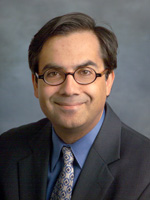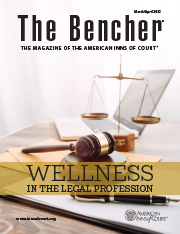Judicial Participation in Lawyer Diversion and Legal Assistance Programs (New York Report)
The Bencher—March/April 2022
By John P. Ratnaswamy, Esquire

 On October 30, 2021, the New York State Bar Association (NYSBA) House of Delegates approved the Report and Recommendations of the NYSBA Task Force on Attorney Well-Being. The report addresses a number of ethical considerations related to wellness. One of the task force’s working groups, the Working Group on the Judiciary and the Courts, submitted the section of the report titled “Practice Not Perfection: A View from the Bench.” A portion of that section is titled “Judicial Ethical Considerations.”
On October 30, 2021, the New York State Bar Association (NYSBA) House of Delegates approved the Report and Recommendations of the NYSBA Task Force on Attorney Well-Being. The report addresses a number of ethical considerations related to wellness. One of the task force’s working groups, the Working Group on the Judiciary and the Courts, submitted the section of the report titled “Practice Not Perfection: A View from the Bench.” A portion of that section is titled “Judicial Ethical Considerations.”
The judicial ethical considerations discussion begins with the premise that it is ethically permissible for judges to engage in extra-judicial activities that improve the law, the legal system, and the administration of justice, citing e.g., New York Judicial Conduct Rule 100.4 on a judge’s extra-judicial activities; and New York Courts Advisory Comm. on Jud. Ethics. Ops. 1309/13-52 (Jan 24, 2013, and Apr 25, 2013). Compare American Bar Association Model Code of Judicial Conduct Rule 3.1 and Comment [1].
The discussion then notes that the advisory committee has determined that judges ethically may participate in lawyer diversion and legal assistance programs, citing Ops. 18-58 (Mar. 29, 2018) and Op. 16-177 (May 4, 2017).
The New York Courts website in part summarizes Op. 16-177 as follows: “(1) A part time judge may volunteer with a departmental grievance committee’s diversion program as a mentor/monitor for an attorney referred to substance abuse treatment. The judge must disqualify him/herself in matters involving the attorney while the relationship is ongoing and for two years thereafter. During this period, disqualification is not subject to remittal unless the attorney waives confidentiality. (2) A part-time judge may volunteer with a bar association’s lawyer assistance committee (LAC) to encourage attorneys to participate in a 12-step recovery program or seek substance abuse counseling. Where the contacts are relatively minimal and occur exclusively in a group setting with other recovering attorneys, disqualification is not mandatory unless (a) the attorney asks the judge to recuse and/or (b) the judge doubts his/her ability to be fair and impartial.” Compare ABA MCJC 2.11.
The court’s website summarizes Op. 18-58 as follows: “(1) A judge may continue to preside in a case after reporting one of the attorneys to a bar association’s lawyer assistance committee, provided the judge can be fair and impartial. (2) A judge who receives information indicating a substantial likelihood that an attorney has substantially violated the requirement of competence under the Rules of Professional Conduct must take appropriate action. What action is appropriate under the circumstances is ordinarily left to the judge’s discretion. However, if the judge determines the attorney’s condition is egregious and seriously calls into question the attorney’s fitness as a lawyer, the attorney’s condition must be reported to the grievance committee. (3) Even if the judge concludes that reporting to the attorney grievance committee is mandatory under the circumstances, the judge may wait until after the case is over before making the report in order to avoid the need for immediate disqualification in all matters involving the attorney.” Compare ABA MCJC 2.11, 2.15.
Op. 16-177 also addresses, to a limited extent, the subject of ex parte communications that might occur between a judge and a lawyer when a judge is concerned about an attorney’s well-being, stating, “The Committee trusts the judge will not ‘initiate, permit, or consider any impermissible ex parte communications with the attorney about any matter before the judge.’” Compare ABA MCJC 2.9. The task force report states in part, “Generally, communication with an attorney about a problem impacting the attorney’s well-being and ability to practice is indeed proper, but safeguards should be put in place to ensure that nothing pending or impending before the judge is discussed.”
John Ratnaswamy, Esquire, is the founder of the Law Office of John Ratnaswamy, LLC, located in Chicago, Illinois. He also regularly serves as an adjunct professor of legal ethics at the Northwestern University School of Law. Ratnaswamy is a former member of the American Bar Association’s (ABA’s) Standing Committee on Ethics and Professional Responsibility and is the current chair of the ABA Solo, Small Firm, and General Practice Division’s Committee on Ethics and Professional Responsibility. This column should not be understood to represent the views of any of those entities or Ratnaswamy’s or the firm’s current or former clients.